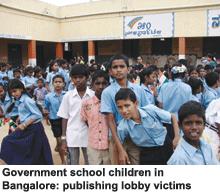Government primary school teachers in the southern state of Karnataka (pop. 58 million) are up in arms against the state government-run Karnataka Textbooks Society (KTS) for maintaining “high standard of English” in its English language textbooks for children in classes I-V of the state’s 36,000 vernacular-medium government primaries.
 On January 30, the Karnataka Primary Teachers Association (KPTA), which represents the state’s 250,000 primary school teachers, lodged a protest with KTS demanding the language be “simplified” for student comprehension. According to Narayan Swamy, president of KPTA, the English language textbooks written for classes I-V students aged six-ten years use “difficult words and convoluted sentences” which children — most of them first generation learners — are unable to learn or understand. “The medium of instruction in primary school is Kannada or the mother tongue, and children are learning English as a subject for the first time in class I. Moreover they come from very poor families and get no home learning support. Therefore it’s very difficult for them to learn English from these textbooks. We want the KTS to simplify the language and use local contexts,” says Swamy.
On January 30, the Karnataka Primary Teachers Association (KPTA), which represents the state’s 250,000 primary school teachers, lodged a protest with KTS demanding the language be “simplified” for student comprehension. According to Narayan Swamy, president of KPTA, the English language textbooks written for classes I-V students aged six-ten years use “difficult words and convoluted sentences” which children — most of them first generation learners — are unable to learn or understand. “The medium of instruction in primary school is Kannada or the mother tongue, and children are learning English as a subject for the first time in class I. Moreover they come from very poor families and get no home learning support. Therefore it’s very difficult for them to learn English from these textbooks. We want the KTS to simplify the language and use local contexts,” says Swamy.
Although Swamy cites student difficulty with English texts as the prime reason for the KPTA protests, academics in Bangalore believe that the real problem is with primary school teachers, upon whom the state government has suddenly imposed the responsibility of teaching primary school English. Under the state government’s confused, patch-work medium of instruction policies of the past half century, the majority of primary school teachers have been entirely schooled in Kannada or other vernacular languages with some even cruising through college and university without learning English. But with English having become the global lingua franca and government school students fleeing to private English-medium schools, the state government introduced study of English — hitherto wholly prohibited in classes I-V — as a second language in 2007.
“Very few government school teachers are comfortable with teaching English. Most of them not only received their entire education in Kannada medium till the pre-university level, they have also earned their dilpoma/bachelor’s degrees in education in the same medium,” says Prof. G.S. Mudambad-ithya, former joint director of the department of pre-university education in Karnataka, who following KPTA protests has been entrusted with revising class I-V English texts and getting them ready for the new academic year starting June.
This situation is ironic because for over nine years after independence and 38 years after the reorganisation of states under the major language formula that was engineered in 1956, and Mysore (later Karnataka) state was carved out of the Madras Presidency, Karnataka enjoyed a national — perhaps even global — reputation as one of India’s premier English-speaking states. The state’s large Anglo-Indian population prom-pted the promotion of some of the country’s most well-known English- medium schools including Bishop Cotton Boys’ and Girls’ (estb.1865), St. Joseph’s Boys’ High School (estb.1858), Baldwin Boys’ (estb.1878) and Baldwin Girls’ (estb.1880) among others, which attracted students from across the country and around the world. Even government village and municipal schools taught English rigorously from class I — albeit as a second language.
All this changed in 1994, when in a populist initiative the state’s Congress-led government with Veerappa Moily as chief minister, enacted a new medium of instruction policy which made Kannada (or mother tongue) the compulsory medium of instruction in primary and upper primary education (classes I-VII).
But since 1994, when Kannada became the medium of instruction in the state’s 36,000 government primary schools and with even private schools prohibited from teaching English — an injunction practised more in the breach — an entire generation became distanced from the English language. The consequence is an acute shortage of English teachers, especially in rural Karnataka. Hence the current KPTA agitation against ‘difficult’ English language primary textbooks.
“Since the state government launched English language training projects in 2007, capacity building measures have not been sustained. To make matters worse, the state’s English-deficient teachers are the ones helping KTS prepare primary school English textbooks which won’t help to improve children’s English skills. For that to happen, the state government has to make sincere efforts to improve teacher-training programmes and consciously promote English by freely permitting English as the medium of instruction, and developing reading habits by promoting public libraries,” says Dr. A.S. Seetharamu, former professor of education at the Institute of Social and Economic Change, Bangalore.
But that’s not likely to happen without a prolonged struggle, as now there’s a huge Kannada textbooks writing, printing and publishing industry with an aggregate annual revenue estimated at Rs.200 crore. This powerful lobby is certain to resist English language teaching and learning.
Swati Roy (Bangalore)